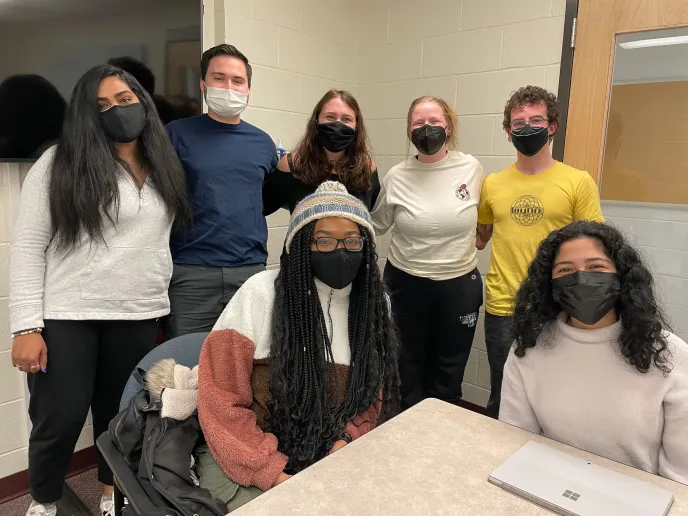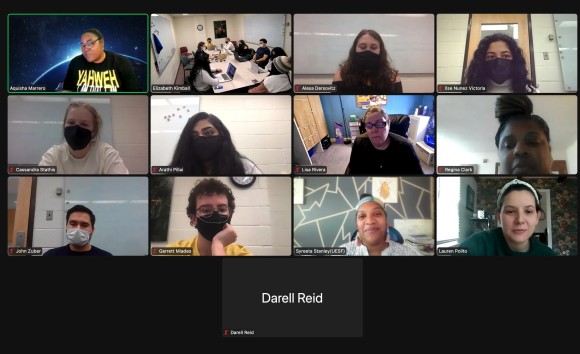Humanities at Work

Students in Elizabeth Kimball's Writing for Social Change course, part of the Humanities at Work project at Drexel University. Image courtesy of Elizabeth Kimball.
Many of us have fond memories of humanities learning when we were students: reading, writing, and making connections in discussions about history, literature, and culture. But it bothers me that for most people, adult life does not allow many opportunities to learn that way. In our spare time we might join a book club or maybe a church study group. At work we have to keep learning, but such learning is mandated by our professions, keeping up with regulations, developments, and trends. Life becomes fragmented into work and leisure, rather than a rich exploration of life in the world.
I’ve started the Humanities at Work project in order to address that fragmentation. Humanities at Work brings the ways and means of the humanities to people through their workplaces. The humanities speak deeply to our working selves: they show us how our work connects to history, creates opportunity, and exacerbates inequality. They give us space to step back from day-to-day operations and imagine new possibilities. They allow us to reflect on the purpose and meaning behind what we do. And they create a space for connecting with our colleagues in a mode that is apart from structures of evaluation and hierarchy. Humanities at Work is a model for doing the humanities in workplaces, by bringing staff together to read, write, discuss, and grow in the context of our working selves.
Currently, the project brings together my students at Drexel University and the staff of social service nonprofit UESF. Pronounced You-Sef, the organization began as the Utility Emergency Services Fund, and is now a comprehensive nonprofit dedicated to helping low-income Philadelphians achieve housing stability and creating social equity. We meet in a model my university calls “side by side,” with students and community members learning together. But my course is the first one that partners with professional staff rather than local adults meeting in their free time. The UESF staff are amazing: they teach the students what it means to do the hard, unglamorous work of providing support to vulnerable families. Many of our conversations involve the day to day mix of details about utility grants, income guidelines, and personal budgeting when there isn’t enough money to last the month. Staff hash out the politics of funding streams and benefit programs. They share what it’s like to have high ideals for social and racial justice and do everyday work that can feel far from that.

However, the class is not just about sharing what it’s like to be a social worker. Our goal is to take that work and put it in dialogue with the humanities using a range of texts and voices across time that can elevate the work and help us see its beauty. We do so by reading texts such as W.E.B. DuBois’s sociological study Philadelphia Negro, poetry by Audre Lorde and Lucille Clifton, and essays by Ta-Nehisi Coates. For example, we read Lorde’s “A Litany for Survival,” where she writes that “when our stomachs are full we are afraid / of indigestion / when our stomachs are empty we are afraid / we may never eat again.” Taken by itself, most readers of privilege might read this poem figuratively, seeing hunger as a kind of spiritual need. The staff saw their own lives and their own clients, and the fear of having too little resources to ever get ahead yet having too much income to qualify for benefits. The staff mostly identify as African American and live in the same historically under-resourced neighborhoods that DuBois researched in 1899; they can extend and amplify his call in a way that no one else can. Students contribute profoundly through their presence, allowing staff to become teachers to a curious and passionate audience. Students also bring fresh skills in critical thinking from their college courses, modeling close reading and textual analysis. Many have written that the course has helped them to see how the creative, open-ended process they love as young writers can be made manifest in collaborative social change work across their careers.
Through conversations with the voices of our humanities texts, we are creating community built around our deep grief for the injustice that 1 in 4 Philadelphians live in poverty. We are coming to terms with the paradox that Philadelphia is the birthplace of modern democracy, a history so important that it was designated as a UNESCO world heritage site, bringing in thousands of international tourists every year. And we are getting stronger by acquiring critical knowledge of structural racism, like the redlining practices that disinvested in Black neighborhoods. Even in the “city of homes,” a place where rowhomes made home ownership possible for millions, Philadelphia’s comparative affordability comes in part from the aging housing stock that only the wealthy can afford to renovate. At the same time, we are connecting with the philosophical and spiritual voices that have offered imaginative new visions for a more equal world, especially when tied to our own city, like Bishop Desmond Tutu’s visit to Philadelphia in 1986 and local efforts to end apartheid.
In time we will expand the project to other workplaces. We hope to also document the outcomes of the project, a complicated task as we are not driven by finite outcomes statements. Instead, we are putting faith in the method of reading, thinking, and learning together with the voices of those writers whose texts speak deeply to our human selves. We trust that in turn, we will make work more human.
Elizabeth Kimball is Assistant Professor of English at Drexel University in Philadelphia. She is the author of Translingual Inheritance: Language Diversity in Early National Philadelphia and other publications about community-based learning.